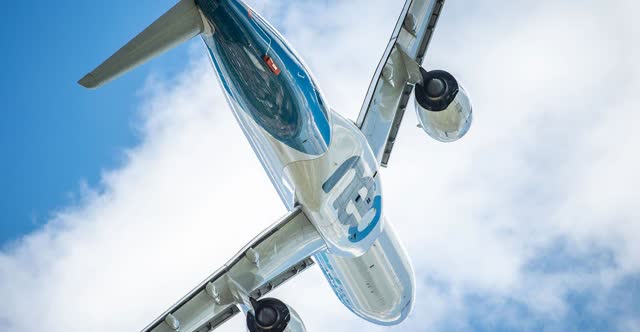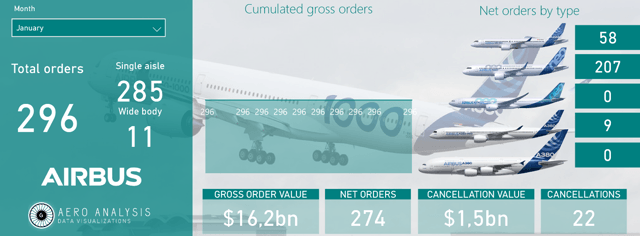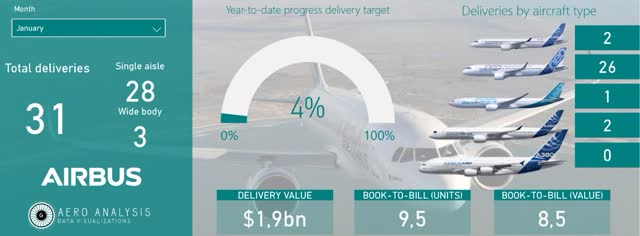Airbus Orders Surge In January
by Dhierin BechaiSummary
- Airbus has started the year on a strong note, with big orders for Airbus A220 and A320.
- Deliveries during were naturally weak during the month.
- Company targets 880 deliveries and has delivered 4% of that in January.
AeroAnalysis has been tracking the monthly order inflow for Boeing (NYSE:BA) and Airbus (OTCPK:EADSY) aircraft for a couple of years. For long-term investors, a single month doesn't mean much. Indeed, a single month does not make a trend, but by closely tracking the order and cancellations activity, we always will be a step earlier in detecting trends and will have detailed insight into customers' appetite to order and take delivery of aircraft, and we can even track it by type as well as the jet maker's ability to reach any set sales target.
Looking at the orders, we can see a combination of willingness to commit with pricing, product, and availability coming together. Special attention will be paid to the mix of single-aisle aircraft and wide-body aircraft, knowing that a single-aisle aircraft costs roughly half or a third of a wide-body aircraft, depending on the model.

In this report, we will have a look at the orders and deliveries as well as cancellation activity for Airbus during the month of January. While the report seems to be a simple summarizing piece, I spent a considerable amount of time to get all data right and present it in a useful way, including graphics, and we uniquely provide market value estimates contrary to list prices. Subscribers of The Aerospace Forum are given access to a fully interactive infographic built on order and delivery data of Airbus and Boeing. If you are interested in reading Airbus's monthly overview for December, you can check it out here.
Orders in January

Figure 1: Orders Airbus January 2020 (Source: AeroAnalysis)
Airbus started the year on a strong note with 296 orders, 285 for its single-aisle product and 11 wide-body orders, valued $16.2B after customary discounts:
- Air Senegal ordered 8 Airbus A220-300s.
- Air France ordered 10 Airbus A350-900s, likely as a replacement to their Airbus A380s.
- BOC Aviation ordered 20 Airbus A320neos, likely taking over the delivery slots from Avianca.
- Cebu Pacific ordered 10 Airbus A321XLRs.
- Air Lease Corporation ordered 50 Airbus A220-300s, 25 A321neos, 27 A321XLRs and 1 Airbus A350-900.
- Spirit Airlines finalized an order for 100 A320neo aircraft (47 A319neos, 33 A320neos and 20 A321neos), the deal was tentatively signed in October 2019.
- CALC ordered 40 Airbus A321neos.
During the month, the following changes and cancellations took place:
- Five Airbus A320ceo orders were transferred from CALC to Viva Air Colombia.
- Aviation Capital Group converted orders for 2 Airbus A320neos to 2 Airbus A321neos.
- CALC converted orders for 15 Airbus A320neo aircraft to 15 Airbus A321neos.
- Wizz Air converted orders for 5 Airbus A320neo aircraft to 5 Airbus A321neos.
- China Eastern Airlines and Juneyao Airlines were revealed as customers for 1 and 2 Airbus A320neos.
- Avianca cancelled 5 Airbus A321neo orders, while converting 21 A321neo orders to the Airbus A320neo of which 15 were subsequently cancelled.
- Lufthansa cancelled orders for 2 Airbus A350-900s.
Airbus started last year with 0 orders and 13 cancellations, so the European jet maker certainly had a strong start of the year driven by mega-orders from Spirit Airlines and Air Lease Corporation. The Airbus A321neo variants keep scoring in the marketplace, while Airbus also received solid lessor backing for the Airbus A220. Widebody order inflow remains Airbus's weaker spot when it comes to securing orders, but with 11 orders, the order inflow looked OK in the first month of the year. Cancellations were driven by Avianca, which has been cutting its growth aspirations steeply amidst financial challenging times, while Lufthansa cancelled 2 A350-900s it previously ordered.
Deliveries in January

Figure 2: Deliveries Airbus January 2020 (Source: AeroAnalysis)
For 2019, Airbus has set a delivery target of 880-890 units, which would be an increase of at least 10% year over year. That was brought down in October last year to 860 units. For 2020, the European jet maker now expects around 880 deliveries. You could say that Airbus is running a bit behind schedule on ramping up its production.
In January, the company delivered 31 aircraft or 3% of its full-year target:
- Two Airbus A220 deliveries occurred.
- Airbus delivered 26 Airbus A320 aircraft, 1 Airbus A320ceo family aircraft and 25 Airbus A320neo family aircraft.
- Airbus delivered 1 Airbus A330 aircraft.
- 2 Airbus A350-900s and 0 Airbus A350-1000s were delivered.
- No A380 deliveries occurred.
What we see is that Airbus started the year with low delivery volumes, which shouldn't come as a surprise as the jet maker has tried to deliver most aircraft in December. Compared to January last year, deliveries decreased by 8 units driven by higher A220 deliveries (+2), lower A320 deliveries (-7), lower Airbus A350 deliveries (-3) and stable Airbus A330 and A380 deliveries.
Book-to-bill
The book-to-bill ratio typically is expressed in gross unit terms by jet makers. This also is the number we show in the infographic. However, it should be taken into account that cancellations and conversions also take place. For January, the gross ratio is 9.5 in terms of gross units and 8.5 in terms of value reflecting low deliveries, which are natural for the first month of the year and high order inflow.
If you go to a net basis for the orders year to date, it would be 8.8 on a unit basis, indicating that net orders were 8.8 times the number of deliveries and 7.7 on a value basis (slightly worse if you take into account that the A220 is part of a joint venture), indicating that the net order value is almost 8 times the delivery value.
Conclusion
You can't conclude anything from one month, other than that Airbus has started the year on a strong note. Deliveries were naturally slow, but this will pick up significantly during the year and shouldn't be reason for concern. At this point, we'd like to see Airbus not only being consistent with its A320neo order, which is a clear winner, but also see the company booking wide-body orders on a consistent level and orders for the Airbus A220. Especially, the Airbus A350-1000 could use an order boost. Other than that, we'd like to see Airbus for once achieving a delivery target that it sets at the start of the year rather than aiming high, missing and then hitting a revised lower delivery target. Currently, there is some pressure from the coronavirus. We have yet to see whether that alters the demand profile for aircraft on the short term, but on the supply side, the Tianjin facility, which roughly should make around 70 A320 aircraft this year, could put a damper on Airbus's 2020 targets. Nevertheless, I believe Airbus is up for a year in which it should be able to exceed 900 deliveries.
*Join The Aerospace Forum today and get a 15% discount*
The Aerospace Forum is the most subscribed-to service focusing on investments in the aerospace sphere, but we also share our holdings and trades outside of the aerospace industry. As a member, you will receive high-grade analysis to gain better understanding of the industry and make more rewarding investment decisions.

Disclosure: I am/we are long BA, EADSF. I wrote this article myself, and it expresses my own opinions. I am not receiving compensation for it (other than from Seeking Alpha). I have no business relationship with any company whose stock is mentioned in this article.